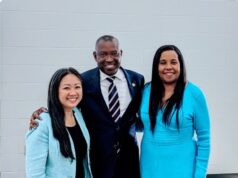From the Virginia House Democratic Caucus:
Virginia Soon Home To New Policies To Fight Racial Inequities
RICHMOND, VA—Virginia House Democrats celebrate their 2020 legislation aimed at addressing racial inequity in Virginia and banning racial discrimination in a multitude of settings, which will go into effect on July 1. New and increased protections against racial discrimination include outlawing racial discrimination based on styles of hair or dress, promoting equal pay regardless of race, and expanding the justice system’s ability to investigate hate crimes based on race.
“We achieved unprecedented progress this session to combat racial inequities in our Commonwealth during the 2020 General Assembly session. But the legislation passed earlier this year is just the start,” said Speaker of the House Eileen Filler-Corn. “We have seen and heard the pain of so many across our Commonwealth and country. As leaders, it is our job to listen, but even more so to act. That is why we will be building upon our equity and anti-discrimination achievements when we return and take further action during the Special Session this summer.”
Although these are important and long-overdue steps in addressing systemic injustice, the Commonwealth has a long way to go. Governor Ralph Northam approved House Democrats’ proposal to create a commission examining the long-term impact of racial inequality on African Americans in the Commonwealth of Virginia. Another piece of legislation implements the Virginia Council on Environmental Justice, to evaluate and recommend actions or improvements our state government can undertake to better address environmental justice issues. Both groups will report to the governor and General Assembly on additional measures to create a more just and equitable Virginia.
“As the first African American serving as majority leader in the House of Delegates, I am personally aware of the opportunity we have to make powerful, meaningful change in how the Commonwealth values people,” said House Democratic Majority Leader Charniele Herring, who introduced the bill (HB 1042) creating the Virginia Council on Environmental Justice, which will propose policies to protect vulnerable communities of color from the health dangers of pollution. “House Democrats stand united in our goal to make Virginia an even better place to live, work, and raise a family, but that can only be achieved if everyone benefits. We hear the pain and frustration radiating across the Commonwealth and we are dedicated to taking further action to make a more racially just Virginia, today and tomorrow.”
Addressing racial injustices, past and present, was part of the historic 2020 legislative session, where Democrats were able to bring about sweeping changes in the Commonwealth as they gained control of the House of Delegates for the first time in more than 20 years.
The legislature repealed unconstitutional racially discriminatory laws from Virginia’s Acts of Assembly enacted in the Jim Crow era, which codified segregation in schools, public transportation, and public spaces, and created obstacles for people of color to vote. House Democrats also amended state code to remove vestigial requirements that race be recorded on marriage, divorce, and annulment records, and to create a release form so property owners can remove prohibited covenants restricting ownership or use of the property from the land records.
As the majority party, House Democrats appointed more women and people of color to leadership and committee chair positions than ever before in the legislative body’s 401-year history. This included the election of Charniele Herring, the first African American and woman to hold the majority leader position.
“House Democrats were elected last year to work toward healing historic injustices felt by many members of our community. We finished the 2020 Session with the most progressive set of legislative accomplishments ever achieved, but there is still more work to be done,” said House Democratic Chair Rip Sullivan. “This is a remarkable moment for Virginia and we feel the responsibility of this moment as public servants. Democrats are approaching the upcoming Special Session with renewed creativity and determination, and I look forward to seeing what further history we make together.”
This year, House Democrats used the majority to address fundamental concerns raised by many Virginians who had been continually overlooked by the General Assembly in past years, passing comprehensive gun safety reforms, completing the ratification process for the Equal Rights Amendment, strengthening LGBTQ rights, reducing voter suppression, providing additional housing and food assistance to financially disadvantaged children and adults, raising the minimum wage, and restoring women’s reproductive healthcare choices.
Here is a summary of the House Democrats’ bills addressing aspects of racial injustice, which all go into effect on July 1 unless otherwise noted:
- HB 394 establishes the appointed position of Director of Diversity, Equity, and Inclusion in the Governor’s administration. The Director will develop and implement a strategic, sustainable plan to address systemic inequities within state government, and facilitate policy creation based on feedback from state employees, external stakeholders, and community leaders. Delegate Jeion Ward introduced this bill.
- HB 432 requires the State Corporation Commission, when engaged in a public utility ratemaking which requires the SCC to determine whether the utility’s costs for goods or services to consumers are “reasonable and prudent,” to use an incremental-cost measure in assessing the utility’s choice of small, woman-owned or minority-owned businesses as vendors. Delegate Jennifer Carroll Foy served as the patron for HB 432.
- HB 581 mandates that the Virginia Department of Human Resource Management develop an online training module for state employees regarding diversity and cultural competency. Delegate Elizabeth Guzman filed the legislation, which requires state employees to take the training between January 1 and April 1, 2021, or within the first 90 days of employment.
- HB 704 (also known as the Virginia Environmental Justice Act) requires the Commonwealth to promote environmental justice and places related definitions into state law. Delegate Mark Keam patroned this bill.
- HB 787 adds hate crimes to the list of crimes that a multi-jurisdictional grand jury may investigate, including trespassing, damage to property, or assault where the victim of the crime was selected due to race or country of origin. Delegate Lamont Bagby served as the patron.
- HB 788 prohibits a deed containing any covenant restricting ownership or occupancy of real property barred by state law from being recorded on or after July 1, 2020, and provides the language for a Certificate of Release of Certain Prohibited Covenants to be recorded to remove any such restrictive covenant. Del. Bagby also carried this bill.
- HB 837 mandates that the Virginia Board of Education provide guidelines on prohibiting racial bias in school dress and grooming code policies, including a requirement that school policies permit ethnically specific or significant head coverings or hairstyles. Del. Carroll Foy filed this legislation.
- HB 916 requires the Department of Education to create the Culturally Relevant and Inclusive Education Practices Advisory Committee, which will provide recommendations for the Department’s upcoming review of Virginia’s history and social science Standards of Learning, while also advising on additional culturally relevant and inclusive education practices. Delegate Mark Sickles introduced this bill.
- HB 1514 amends the Virginia Human Rights Act to include a ban on racial discrimination based on hair texture, type, or hairstyles such as braids, locks, and twists. Delegate Delores McQuinn served as the patron.
- HB 1519 establishes the Commission to Study Slavery and Subsequent De Jure and De Facto Racial and Economic Discrimination Against African Americans. The commission will examine the long-term impact of racial inequality on African Americans in the Commonwealth of Virginia, and make recommendations to the General Assembly on appropriate remedies. Del. McQuinn also introduced this bill.
- HB 1042 creates the Virginia Council on Environmental Justice to advise the Governor and General Assembly on how to better protect low-income communities of color from disproportionate impact of the health dangers of pollution. Majority Leader Charniele Herring filed HB 1042.
- HB 1162 sets environmental justice as one of the purposes of the Virginia Department of Environmental Quality. The bill was patroned by Delegate Alfonzo Lopez.
- HB 1164 expands the Department of Environmental Quality’s statement of purpose to include addressing both climate change and environmental justice as priorities of the Department. Environmental justice relates to the DEQ’s fair treatment and meaningful involvement of all Virginians, no matter their race, color, national origin, faith, disability, or income, with respect to administration of environmental laws. Del. Lopez also served as the patron for this bill.













